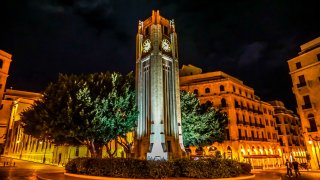Will Lebanon Ever Find an Effective Leader?
An interview with a former Lebanese minister shows that transformative change in Lebanon is no longer just desirable but necessary for the country’s survival.
Lebanon remains without an elected president while its people watch helplessly as their country risks further escalation with Israel and slides deeper into poverty. Average Lebanese citizens have little to no faith in the political system, which they regard as the cause of their suffering. However, the crisis goes beyond the inadequacies of Lebanon’s constitutional form of government and has more to do with the quality of the people in power today. Many critics of the system and how Lebanon has operated for the past decades—since the end of the Lebanese Civil War (1975–90)—have chosen to speak up more forcefully in opposition and offer potential alternative solutions.
Former Lebanese Minister Ibrahim Hanna-el-Daher, who headed the Ministry of State for Administrative Reform (OMSAR) in 2004, spoke with The National Interest about what lies at the heart of Lebanon’s failures. Regarding how most Lebanese people see politicians today, Daher said it is generally negative. This is a well-known fact. However, he also explained that many decent political people cannot fulfill their ideas and plans because of the existing hurdles in the sectarian system.
“The common view of citizens today toward the government is extremely negative. Politicians are inept, inefficient, and corrupt. This is true of many people in a position because of their allegiances. However, many officials carry out their responsibilities professionally and honestly but are forced into corners by leaders who do not care about the nation’s interests or citizens.”
Finding A Way Out
Lebanon has been without a president since October 2022, when Michel Aoun left office after serving a six-year term. The chances of a new president being elected will increase if there is a consensus from the major blocs in parliament. The two largest representations are led by Hezbollah on one side and the Lebanese Forces Party on the other. Mr. Daher commented at length on this issue, which must be solved if Lebanon is to see any long-term rescue plan.
When asked if he could be a candidate, Daher had this to say… “If I will be able to restore hope to the Lebanese people and brush off the dust of hatred and division—If I can work on bridging the gap between political factions, of course. I will run for the presidential elections. However, running for a position without any added value is out of the question. I will fulfill my duty towards the Lebanese youth without holding any office because loyalty to Lebanon does not require a title of president, minister, or deputy.”
Indeed, the requirements of Lebanon’s youth should take precedence above all others. It is their future that is being threatened every day with war, economic deprivation, and a lack of strong leadership that operates with integrity. Mr. Daher talked about the role he would contribute if and when a president is elected.
“My goal is to work with whoever is ready to take up this responsibility and to find solutions on the table. It’s a pity we have not yet found the right person. Of course, there are many reasons for that. I do not believe the reasons lie in the fault of our system. It is a problem of governance. People are not professionals in our model. Our system is democratic—it is not terrible. The issue today is that the differences between the two blocs are extremely deep. We need a president who can find common ground between the two parties that serves the country, the interests of citizens and coexistence.”
Daher added, “This president needs to understand and relay the worries of everybody. But most importantly, this kind of individual must always have people’s best interests at heart. People are suffering in silence.”
On the surface, if a visitor comes to Beirut, many things still appear normal and back to pre-financial crisis mode. This is because millions of Lebanese abroad still have strong connections to their homes and families. They provide remittances and other forms of assistance that give people room to breathe. This is part of the illusion of normality the Lebanese people like to exhibit to the world. However, this is far beyond the truth.
Daher noted that this situation is untenable: “The Lebanese people are very proud. They have lots of compensation from their relatives and friends. The situation is unbearable, and the people cannot go on this way indefinitely.”
“What is curious to me is the following…when you speak with ordinary people and try to tell them about any ideas for rebuilding Lebanon—nobody believes it. People have become cynical and say it’s impossible to reform. They believe, and it is true, that no one at the top cares about their real problems. People at the bottom are really hurting. They need to believe again and be given renewed confidence. This is the keyword.”
Demanding a state be accountable for its actions is a prerequisite for any governance model. A nation’s success does not simply appear out of thin air. It takes planning, commitment, and integrity. Change in Lebanon is no longer just desirable but necessary for the country’s survival.
Adnan Nasser is an independent foreign policy analyst and journalist who focuses on Middle East affairs. Follow him on X at @Adnansoutlook29.
Image: Shutterstock.com.

